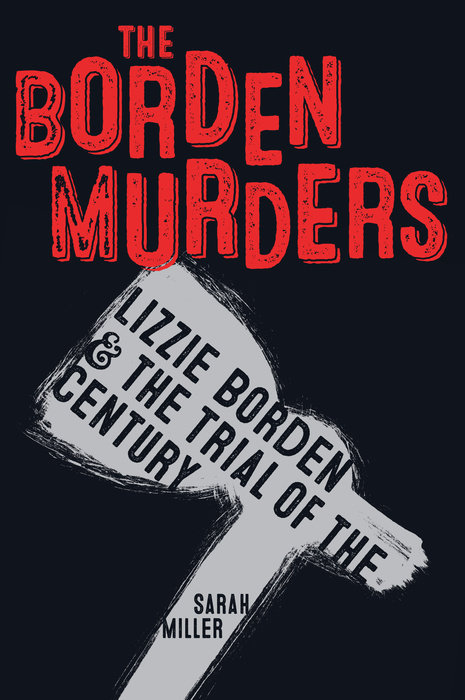Thursday, August 4, 1892
Lizzie could hardly look past the blood, there was so much of it. Blood soaked Mr. Borden’s neatly folded Prince Albert coat. It dripped from the slick horsehair cushions to the flowered carpet below. It arced in a fine spatter across the wall and picture frame above. In the midst of it all, her father lay stretched out on the couch with his face so carved and bloodied that she did not know whether he was alive or dead. “I did not notice anything else, I was so frightened and horrified. I ran to the foot of the stairs and called Maggie.”
Bridget Sullivan--nicknamed Maggie by Lizzie and her sister--had barely managed to drift to sleep when the shouting woke her. Bridget did not dally an instant. A housemaid had no business stealing a few winks at eleven in the morning, and besides,that scream was too loud, too strident for any ordinary reprimand.
“What is the matter?” Bridget shouted back.
“Come down quick!”
Down three…
Thursday, August 4, 1892
Lizzie could hardly look past the blood, there was so much of it. Blood soaked Mr. Borden’s neatly folded Prince Albert coat. It dripped from the slick horsehair cushions to the flowered carpet below. It arced in a fine spatter across the wall and picture frame above. In the midst of it all, her father lay stretched out on the couch with his face so carved and bloodied that she did not know whether he was alive or dead. “I did not notice anything else, I was so frightened and horrified. I ran to the foot of the stairs and called Maggie.”
Bridget Sullivan--nicknamed Maggie by Lizzie and her sister--had barely managed to drift to sleep when the shouting woke her. Bridget did not dally an instant. A housemaid had no business stealing a few winks at eleven in the morning, and besides,that scream was too loud, too strident for any ordinary reprimand.
“What is the matter?” Bridget shouted back.
“Come down quick!”
Down three flights of stairs Bridget came pounding to find Miss Lizzie Borden in a state such as she’d never seen before--backed up against the screen door as though she were about to flee the house entirely.
“Go for Dr. Bowen as soon as you can,” Lizzie commanded. “I think Father is hurt.”
Instinctively Bridget moved toward the sitting room to see what was the matter with her employer, Mr. Andrew Borden. “Oh, Maggie, don’t go in,” Lizzie cried. “I have got to have a doctor quick. Go over. I have got to have the doctor,” she insisted.
Bridget dashed across Second Street and “rang violently” at Dr. Bowen’s door, only to have Mrs. Bowen inform her that thedoctor was out making house calls. Back Bridget hurried with the bad news. Lizzie had not budged from the doorway.
“Miss Lizzie, where was you?” Bridget ventured to ask. “Didn’t I leave the screen door hooked?”
“I was out in the backyard and heard a groan, and came in and the screen door was wide open.”
But Lizzie Borden did not want to answer questions. She wanted help. If she could not have the doctor, she wanted her friend, Miss Alice Russell. “Go and get her,” she begged. “I can’t be alone in the house.”
Bridget yanked her hat and shawl from their hook and took off toward Borden Street.
Lizzie Borden waited, alone--as far as anyone knew. There were three locks on the front door. No one intent on harming her father could have gotten in that way. And anyone who might still be lurking inside could not possibly escape without her notice now.
“Lizzie, what is the matter?” said a voice from behind her. But it was only Mrs. Adelaide Churchill, the young widow next door. On her way home from her marketing she’d noticed Bridget crossing the street from Dr. Bowen’s house, “running, and she looked as if she was scared.” Mrs. Churchill went straight home and laid her groceries on a bench in the kitchen. Through her kitchen window she caught a glimpse of Miss Lizzie leaning against the doorway of the back screen, rubbing her face “as if she was in great distress.” The young woman looked so much out of sorts, Mrs. Churchill had opened her window and called across the fence.
“O, Mrs. Churchill,” Lizzie answered, “do come over, somebody has killed Father.”
By the time Mrs. Churchill hurried across the yard, Lizzie had sunk down onto the second step, “pale and frightened.”
“O Lizzie, where is your father?” she asked, laying a hand on Lizzie’s arm.
“In the sitting room.”
Mrs. Churchill did not go in. Instead, she asked, “Where was you when it happened?”
“I went to the barn to get a piece of iron.”
“Where is your mother?”
“I don’t know,” Lizzie said, her words spilling out now, “she had a note to go and see someone that was sick this morning, but I don’t know but they have killed her too. Father must have had an enemy, for we have all been sick, and we think the milk has been poisoned. Dr. Bowen is not at home, but I must have a doctor.”
“Shall I go, Lizzie, and try to find someone to go and get a doctor?” Mrs. Churchill asked.
She answered yes, and Mrs. Churchill ran across the street to L. L. Hall’s Stable for help.
Lizzie Borden did not want to be alone in that house. She had told Bridget so, and still Bridget had brought her neither the doctor nor Miss Russell. Where could that girl be?
“I don’t know but what Mr. Borden is dead”
It was no more than quarter past eleven when Alice Russell saw the Bordens’ maid hurrying up her front steps. Right then Alice knew there was trouble. Only last evening herfriend Lizzie had come calling with worrisome news. She and her father and stepmother, Lizzie said, had all been taken sick Tuesday night--very sick indeed.
Alice laid aside her work at once and met Bridget at the door.
“What is it, Bridget? Are they worse?” Alice asked.
Bridget did not take time to explain. She hardly knew herself just what had happened. “Yes,” the young Irishwoman said. “I don’t know but what Mr. Borden is dead.” She paused only long enough to hear Alice say she would come before taking off again. To Bridget’s relief, Dr. Bowen was just stepping from his carriage as she ran back up Second Street.
“What is the matter, Lizzie?” Dr. Bowen asked as he entered the house.
Under any other circumstances, the sight of his familiar face with its graying mustache andside-whiskers might have calmed Lizzie. After all, he had lived across the street from the Bordens for twenty years; she had known him since she was agirl of twelve.
Lizzie answered that she was afraid her father had been stabbed or hurt.
That one word--stabbed--took him aback. He expected sickness, possibly bad, judging from the way his wife had called out They want you quick over to Mr. Borden’s! before he stepped from his carriage. Even poisoning would not have completely surprised him. The previous day, Mrs. Borden had arrived at his office before eight o’clock in the morning, nearly hysterical with fear that her family’s bread had been tainted. But stabbing?
“Has there been anybody here?” Dr. Bowen asked.
Not as she knew of, Lizzie answered.
“Where is he?” the doctor asked.
Lizzie led him through the dining room and motioned toward the sitting room door. Not a sound came from the other side.
Steeled for the worst, Dr. Bowen went in.



